
- •Voronezh state university
- •50 Things you need to know about britain.
- •50 Things you need to know about britain.
- •1). Stonehenge
- •2). St. Augustine and Christianity
- •3). Canterbury Tales
- •4) Religious settlement
- •5) Shakespeare
- •6) Gin craze and British drink culture
- •Battle of Waterloo and national identity
- •* The battlefield today
- •8)The Red House and ‘my house is my castle’
- •10) The Beatles
- •Alfred the Great.
- •Magna Charta (1215).
- •3) English Civil war of 1642 -1649.
- •4) The Glorious Revolution. (1688 - 89)
- •5) Birth of Great Britain, Act of Union in 1707.
- •6) Robert Walpole – the first Prime Minister.
- •The British Bobby.
- •Suffragettes
- •*The Suffragettes wanted the right for women to vote.
- •9). National Health Service
- •Results
- •(Http://en.Wikipedia.Org/wiki/Welfare_state_in_the_United_Kingdom) *The National Health Service
- •10). Britain Joining Europe*
- •*A History of the European Union and Great Britain
- •Introduction.
- •1). The Roman Invasion
- •2). The Norman invasion of 1066
- •3). Elizabeth I and the Spanish Armada
- •4). East India Company and the battle of Plassey
- •5) Tea and American Revolution
- •1. What is understood by the “Boston Tea Party”*?
- •3. Why did the British loose the battle?
- •6) Nelson and the Battle of Trafalgar
- •7). Slave trade
- •Campaign to abolish the slave trade
- •8) Dr Livingston and exploration of Africa*
- •9)The Windrush and the Empire
- •Identity
- •10). The Channel Tunnel* and the Eurostar
- •Early Plans
- •A Contest
- •The Design for the Channel Tunnels
- •Getting Started
- •Building the Channel Tunnel
- •Connecting the Tunnels
- •Finishing the Channel Tunnel
8) Dr Livingston and exploration of Africa*
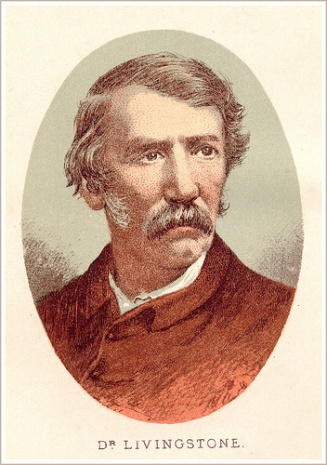
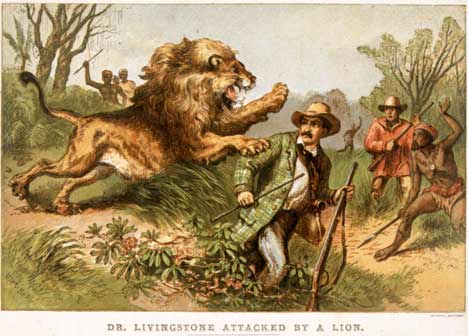
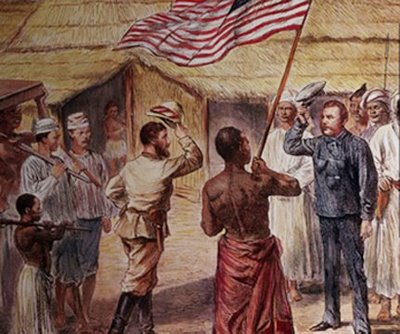
Task 14. What do you know about the following places or things:
Lanarkshire, the Limpopo, the Zambezie, the Nile, Biblical times, the Congo, Victoria Falls, Tanzania, Westminster Abbey ?
Task 15. Who are the following people: Dr Livingstone*, H.M.Stanley?
Task 16. Answer the following questions:
Describe the life of David Livingstone
What was the utmost goal of his expeditions?
Who and in what circumstances found Livingstone after his disappearance?
What is the legacy of Livingstone’s expeditions in Africa?
How was Africa colonised? (use cultural commentary )
Glossary
To be obsessed – быть одержимым чем-либо (идеей и т.д.)
To map smth – наносить на карту новые земли
Interior – внутренние районы
Abolishing – запрет
Lucrative – прибыльный, доходный
Quest – поиски
Carve – делить, расчленять
Legacy – наследие
Grapple – борьба, бороться
Cultural Commentary
*David Livingstone
was a Scottish missionary and one of the greatest European explorers of Africa, whose opening up the interior of the continent contributed to the 'Scramble for Africa'.
Livingstone was born at Blantyre, south of Glasgow on 19 March 1813. At 10 he began working in the local cotton mill, with school lessons in the evenings. In 1836, he began studying medicine and theology in Glasgow and decided to become a missionary doctor. In 1841, he was posted to the edge of the
Kalahari Desert in southern Africa. In 1845, he married Mary Moffat, daughter of a fellow missionary.
Livingstone became convinced of his mission to reach new peoples in the interior of Africa and introduce them to Christianity, as well as freeing them from slavery. It was this which inspired his explorations. In
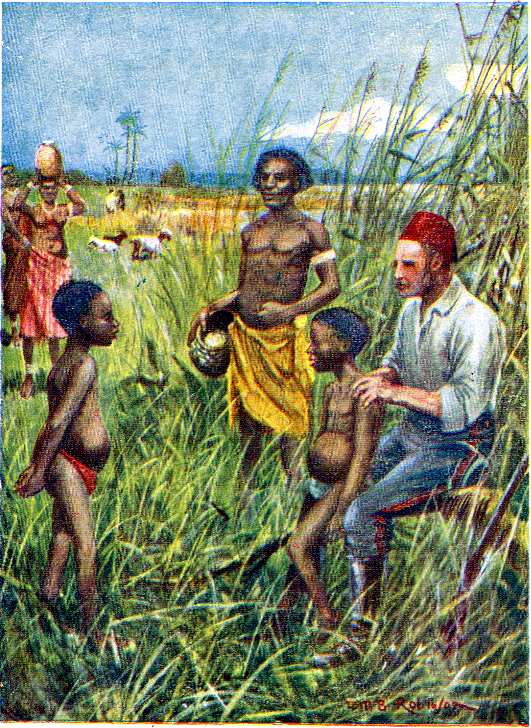
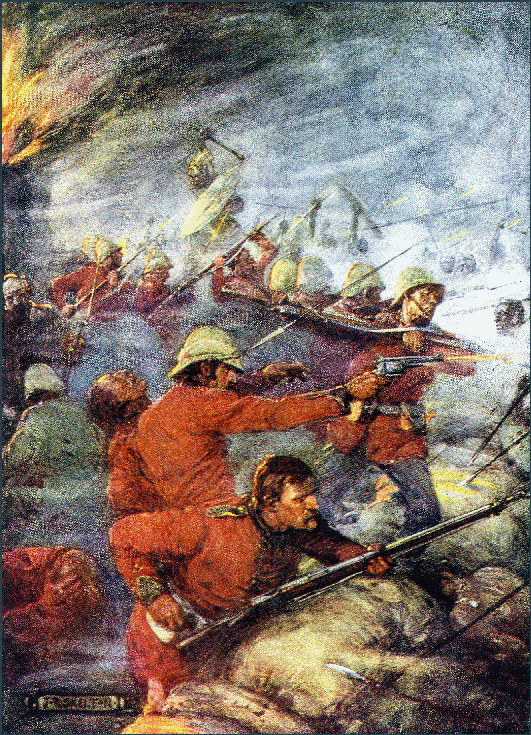
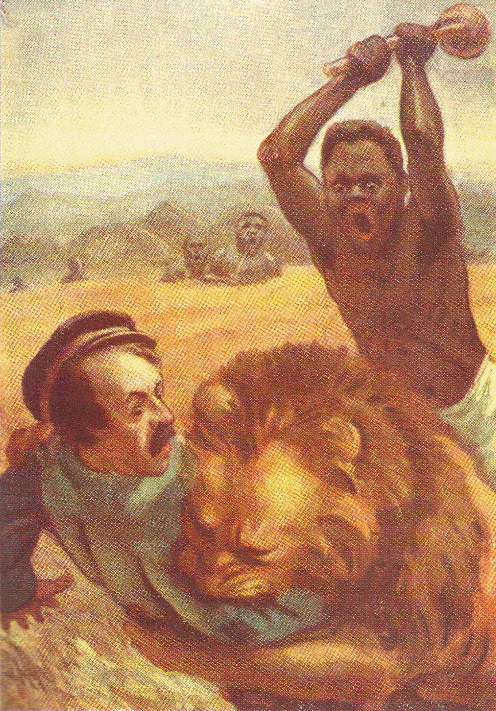
1849 and 1851, he travelled across the Kalahari, on the second trip sighting the upper Zambezi River. In 1852, he began a four year expedition to find a route from the upper Zambezi to the coast. This filled
huge gaps in western knowledge of central and southern Africa. In 1855, Livingstone discovered a spectacular waterfall which he named 'Victoria Falls'. He reached the mouth of the Zambezi on the Indian Ocean in May 1856, becoming the first European to cross the width of southern Africa.
Returning to Britain, where he was now a national hero, Livingstone did many speaking tours and published his best-selling 'Missionary Travels and Researches in South Africa' (1857). He left for Africa again in 1858, and for the next five years carried out official explorations of eastern and central Africa for the British government. His wife died of malaria in 1862, a bitter blow and in 1864 he was ordered home by a government unimpressed with the results of his travels. At home, Livingstone publicised the horrors of the slave trade, securing private support for another expedition to central Africa, searching for the Nile's source and reporting further on slavery. This expedition lasted from 1866 until Livingstone's death in 1873. After nothing was heard from him for many months, Henry Stanley, an explorer and journalist, set out to find Livingstone. This resulted in their meeting near Lake Tanganyika in October 1871 during which Stanley uttered the famous phrase: 'Dr Livingstone I presume?' With new supplies from Stanley, Livingstone continued his efforts to find the source of the Nile. His health had been poor for many years and he died on 1 May 1873. His body was taken back to England and buried in Westminster Abbey.
(http://www.bbc.co.uk/history/historic_figures/livingstone_david.shtml)
*Exploration of Africa (British Empire—Colonial Africa (1795 to 1909)
Substantial British Influence in Africa was not established until the 19th century, and was confined to several regions which have separate histories. By the turn of the 20th century, British holdings included Sierra Leone, the Gold Coast (modern Ghana) and Nigeria in West Africa; the region now composed of South Africa, Botswana, Zambezi, and Zambia in the south; and Uganda and Kenya in the East. In addition, British forces controlled the regions of Egypt and Sudan, although nominally these were still part of the Ottoman Empire. Although British traders, including slave traders, had operated off the west coast of Africa for several hundred years, they confined their operations mainly to a few coastal trading ports and islands, since the African interior was thought to be uninhabitable by Europeans. Britain did not actually gain control of Capetown in South Africa until around 1800, and did not acquire her other colonial holdings until the late 19th century. British colonization of Africa therefore occurred nearly 100 years after its colonial expansion in Asia, and over 200 years since its colonization of North America.
The British colonization of Africa proceeded in a much more hesitant manner than that of Asia. While Asia was essentially colonized by trading companies, which had but one objective in mind, Britons with imperial interests in Africa included missionaries and humanitarians, as well as traders; but even among the humanitarians there was little consensus about what could or should be done about such native practices as domestic slavery, witchcraft, inter-tribal warfare, and human sacrifice. Because of the difficulties with native populations, an unhealthy climate and uncertain commercial opportunities, there was much reluctance and controversy regarding what Britain’s objectives should be in the region, beyond preventing other countries from colonizing the region. Control of the British government changed parties rather frequently and no grand or consistent colonial policy regarding Africa was pursued from above. For this reason, committed individuals who were willing to work over the long term, were often very influential in determining British "African policy". Some examples of this were Charles Gordon in the Sudan, George Goldie in Nigeria, Cecil Rhodes in South Africa, and David Livingstone.
Certainly, by the 1880’s when the discovery of both gold and diamonds had caused hundreds of fortune seekers to flock to the region, there was a great deal of greed and exploitation involved in the development of Africa, but it is false to characterize British influence in Africa as purely exploitive in nature. Serious colonization of Africa by Britain did not begin until after the slave trade was outlawed, and much of the wrath directed against Britain by the natives, was because of its policy of opposing slavery and witchcraft, which were thoroughly ingrained into native African culture. Millions of dollars were spent on humanitarian relief for the natives; hundreds of missionaries risked their lives to bring the best aspects of civilization to the African tribes. The problems of Africa have always been serious and difficult of redress, before, during, and after colonization, but it is certain that many of the most committed of British colonizers, were motivated to alleviate the suffering of the native populations, and not entirely driven by greed.
The geography of the African interior was almost completely unknown well into the 19th century, but when exploration was finally undertaken most of the adventurers were British Scots. One of the earliest explorers of Africa was James Bruce who discovered the source of the Blue Nile in 1770. Soon after Mungo Park discovered the Niger river by traveling across land, but never determined its source or mouth. Several other British explorers, including Hugh Clapperton and the Landers brothers continued to explore this region over the next few decades. They determined the course and the outlet of the Niger, but not much was done to follow up their efforts because of the extreme danger of traveling inland in this region. The source of the White Nile and Lake Victoria, were not discovered until 1856 by John Hanning Speke and Richard Burton, and David Livingstone, the most famous of African Explorers, did not undertake his first expedition to cross the southern horn of the continent until 1852, and by his death in 1873, much of the interior of the continent was still unknown. It was left to H. M. Stanley, yet another Scotsman, to cross the continent east to west, and in 1874 discover the route of the Congo river. Even after these discoveries were made further development was proceeded very slowly, and large swaths of the continent lay unexplored.
West Africa
In West Africa, France was the major colonial power in the region, and British traders held only a few outposts, and even held these half-heartedly at times, since it was difficult to retain governors. The climate was deadly for white men, and few ventured into the interior. The coast possessed some honest traders, and mission stations, but the overall character of many of the Europeans who did venture into the regions was poor—pirates and slavers abounded, and even many philanthropic ventures that were naively attempted ended in disaster. During the 19th century, British traders established several additional outposts in the Gold Coast region, and made alliances with the Fanti, who were the dominant coastal tribes at the time. During the same period, the interior Ashanti tribe was becoming more powerful, and sought to displace the Fanti and take over the coastal trade. The first Ashanti War occurred when the Ashanti's made several raids into the coastal settlements protected by the British and burned Fanti villages. Since the area was under their protection, the British made several raids into Ashanti territory between 1826 and 1874 in order to punish the incursions. A final uprising in 1896 resulted in the declaration of the territory as the Crown Colony of the Gold Coast.
The man most responsible for the establishment of Nigeria as a British colony was George Goldie, who for twenty years worked to establish a functioning government to Nigeria. Unable to get Britain to commit, he raised funds privately, and founded a government chartered development company. He essentially governed the region himself for twenty years, until "selling-out" to Britain in 1900. Like most people of the his age, he did not think the natives were capable of governing themselves humanely, and saw his role both as promoting commerce and civilization.
South Africa
The Cape Town region of South Africa was originally settled by the Dutch East India Company in the 17th century, and by the time the colony fell into British hands, around 1800, much of the population had been established in the area for over 150 years. The Native Dutch, also called Boers, or Afrikaners, were fiercely independent slave-owners, and they resented the British interference. When the British government decided to abolish slavery in all of its colonies, many of the Boers decided to pack up their belongings and move out of the sphere of British influence. They first settled in Natal, on the east side of the peninsula, but as Britain had already started to form settlements in the area, they moved across the Vaal river, into a desolate wilderness, inhabited by Zulu tribes. After using their usual methods of slaughter, enslavement, and diplomacy to bring the native tribes to bay, the Boers settled and formed two republics in the region, the Orange Free State, and the Transvaal Republic.
Meanwhile, Cape Town, Natal, and several other towns in the south grew under Britain’s protection. In 1867 however, diamonds were found in a remote area of Kimberly, claimed by both Britain and the Transvaal. The commerce and industry minded English were in a far better position to exploit the discoveries, and so took over government of the area. Within ten years of the discovery of South African Diamonds, Cecil Rhodes, a young man from a middle-class farming family in England, had built a diamond-mining empire that gained greater and greater control of the market until he had a multi-million dollar cartel at his disposal. In spite of his personal riches, Rhodes led a relatively austere life, and threw his entire energies and much of his wealth into the project of unifying the various colonies of South Africa under a single government, within the British commonwealth. With this goal in mind, he negotiated with the native tribes, and helped to lay claim to the regions north of the Transvaal, including modern Botswana, Zambia, and Zambezi. He did much else to the lay the groundwork for unification, but was hotly resisted by the Boers, who hated British rule, and loved their independence.
The population of the Zulu nation increased quickly under British protection, and soon there was conflict with the Boers and other British colonies. The British regiment that was sent to put down Cetewayo, the Zulu king of the time, was caught off guard and slaughtered in one of the worst massacres in British history. It took the British nearly a year to regroup, but they eventually destroyed the Zulu capital, and sent the king into exile. No sooner had the British prevailed against the Zulu’s, and annexed the Boer republic, but the first Boer War broke out and went very badly for the British. The current Prime minister, William Gladstone, was glad to make peace with the Boers and granted them their independence, much to the dismay of Rhodes and other die-hard imperialists, who believed that South Africa could only thrive under a unified government.
Yet the situation would get uglier still. In 1885, an enormous vein of gold was discovered in the Transvaal. The Boers themselves were agricultural and only wanted to be left alone, but could do nothing to prevent the enormous influx of foreigners into their territory. They did however, tax the miners, but did not allow the outlanders to have a say in government. Since many of the outlanders were British, this was an excuse to attempt to annex the area into British territory, and an unofficial "revolution" was staged which ended in disaster. By 1899 the pressure was at an intolerable level, and the Boer’s laid siege to three British cities. This was the start of the very costly and difficult second Boer War. It lasted until 1902, but ultimately, the far stronger British defeated the republic and forced the Boers to submit to British government. It took ten more years to integrate the colonies, but neither the imperialist Cecil Rhodes nor his Boer nemesis Paul Kruger lived to see the birth of the South African Nation.
Egypt-Sudan
Even before the Crimean War, during which Britain took the side of the Ottoman Turks against Russia, the British had developed friendly relations with some Ottoman rulers, particularly Mehemet Ali, who had taken control of Egypt and the Sudan, and allowed the British to run a transportation line (P.& O.) from Alexandria to the Red Sea, to facilitate travel to India. Unfortunately, Mehemet’s successors did not govern as ably as he did, and relied on Britain and other European powers provide advice on modernization, and to bail them out of financial trouble. The Suez canal was begun with the aid of the French, but through diplomacy and other shenanigans, Britain ended up controlling an minority share. Soon after the opening of the canal, Britain was called upon to help put down Arabi's Rebellion against the Egyptian government, and at the Battle of Tel-el-kebir drove the rebel leader into exile. By this point Britain was no longer playing merely an "advisory" role in Egypt, but by assuming control of both the finances of the Egyptian government, and also the military, it was in effect, although not in name, ruling the region.
Meanwhile the great British military hero Charles Gordon, who had already distinguished himself by his valiant service in China and Britain, was appointed Governor of Sudan, a region where slavery was still rife, and the natives were severely oppressed by warlords, bandits, and Moslem slavers. Gordon worked ceaselessly for five years to improve the condition of the natives, and returned to Britain in 1879, exhausted. Shortly after Gordon left Sudan a rebellion broke out, lead by the Mahdi, a fanatical Moslem warlord. Within a few years he controlled much of Sudan, and murdered and enslaved those who opposed him. In 1884, when Gordon heard that Khartoum, the capital of Sudan was threatened, he returned to help defend the city and urged the British government to send a relief party. The relief party however, after many delays, arrived too late, and Gordon was killed when the city of Khartoum was taken. It was not until 13 years later, that this disgrace was avenged by Horatio Kitchener, hero of the Soudan Campaign at the Battle of Omdurman, and the Mahdists finally driven out of Sudan. Egypt and Sudan continued under British protection until finally becoming an official colony after the Great War.
(http://www.heritage-history.com/www/heritage.php?Dir=eras&FileName=britain_13.php
